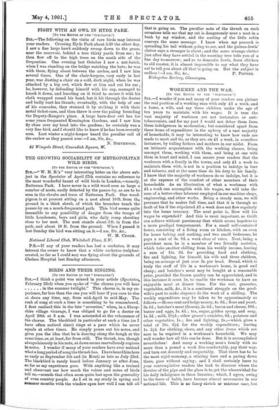BIRDS AND THEIR SINGING.
[TO THE EDITOR OF THE " SPEOTA.TOR.9
think a point was missed in your article (Spectator, February 23rd) when you spoke of " the chorus you will hear
in the summer twilight." This chorus is, in my ex- perience, far less than the one you will hear if you care to rise at dawn, any time, say, from mid-April to mid-May. The rush of song at such a time is something to be remembered. I first realised this in the late " seventies," when, in a Shrop- shire village vicarage, I was obliged to go for a doctor on April 20th at 3 a.m. I was astounded at the vehemence of the chorus. The blackbird in particular at such a time (as I have often noticed since) sings at a pace which he never equals at other times. He simply pours out his notes, and gives you the idea that he is dancing along the bough at the same time, or, at least, far from still. The thrush, too, though alwaysleisurely in his note, at dawn seems marvellously copious in notes. I wonder if many of your readers have ever noticed what along period of song the thrush has. I have heard him here as early as September 5th and (in Kent) as late as July 23rd. The blackbird is rarely heard before January or after June, so far as my experience goes. With anything like a trained and observant ear how much the voices and notes of birds tell us,—sounds that often seem quite lost upon the generality of even country people. As I sit in my study in spring and summer months with the window open how well I can tell all
that is going on. The peculiar note of the thrash on such occasions tells me that my cat is dangerously near a nest in a bush by my window, and the wailing of the little robin conveys the same message. I know when my peacock is spreading his tail without going to see, and the guinea-fowls' clatter says a stranger is about; and the same strange clatter just after they have settled in the roosting tree tells you of a fine day to-morrow; and as to domestic fowls, from chicken to old rooster, it is almost impossible to say what they have not to tell you about all that is going on. But the subject is
endless !—I am, Sir, &c., P. POTTER. Bishopston .Rectory, Glamorgan.










































 Previous page
Previous page